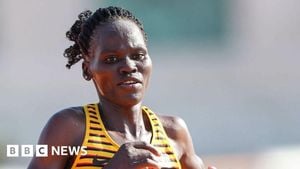Gabon is at a pivotal crossroad as its citizens participated in voting on November 16, 2024, to decide on a new constitution following the military coup which deposed President Ali Bongo Ondimba. With nearly one million eligible voters casting their ballots, the referendum is seen as a significant step toward establishing democratic governance after decades of dynastic rule by the Bongo family.
The aftermath of the coup has left Gabon on the lookout for transformation. General Brice Oligui Nguema, the head of the transitional military government, aptly noted, "This is something I note, and it's positive. A huge step for the transition," as he voted at the Lycee Leon M’Ba school. The proposed changes to the constitution include term limits for the presidency, preventing family members from succeeding the head of state, and dissolving the position of prime minister.
The new constitution suggests the introduction of two seven-year terms, mandatorily requiring presidential candidates to be exclusively Gabonese, which would undermine the prospect of Bongo's return to power since he is married to a foreigner. Having held the presidency since 2009 and inherited it from his father, Omar Bongo, who ruled from 1967 until his death, the political legacy of the Bongo family has drawn criticism for corruption and mismanagement from the Gabonese populace.
Under the new proposals, more than 50% of voters are needed to pass the constitution, thereby ensuring the military's roadmap to returning power to civilians, as promised. Yet, the transitional government has drawn skepticism for potentially manipulating the process to maintain its hold on power. Observers have raised concerns about the junta's control over electoral processes, which might skew voting outcomes.
The campaign surrounding the referendum has been underscored by the junta's influence, with enormous social media broadcasts and public service announcements urging citizens to vote 'yes'. Posters of General Nguema promoting the 'yes' vote have proliferated across Libreville, making it difficult for detractors of the proposal to make their voices heard.
Among those who stood in line to vote, some have expressed optimistic sentiments toward the military leadership. Nathalie Badzoko, age 33, indicated her support for the junta, stating, "I have faith in the people's power and believe this will improve the living conditions here." Yet, she admitted to not fully reading the proposed constitution’s 173 articles. This sentiment was echoed by taxi driver Louembe Tchizinga, who reiterated his hopes for the progressive changes. Meanwhile, critics like lawyer Marlene Fabienne Essola Efountame are raising alarms over the potential consolidation of power within the presidency, noting, "We are creating a dictator who designs the constitution for himself," and are wary of the ability of the military to oversee fair elections.
Despite these concerns, the importance of the referendum cannot be understated. It is poised to mark the first major effort to restore democracy and respect for human rights after years of authoritarian regimes. General Nguema has announced plans for civilian resurrection of power by 2025, but whether this stands to materialize remains uncertain.
What foots the bill for Gabon’s constitutional referendum, on the surface, is hope for renewed governance. Yet, the impact of military oversight lurks ominously over the proceedings, raising questions about the true nature of Gabon's impending political future. With the final results promised by the constitutional court, the coming days will reveal whether the people’s choice affirms their aspirations for democracy or leads to continued military dominance over governance.



